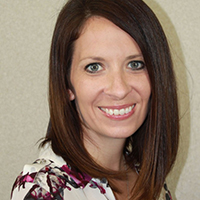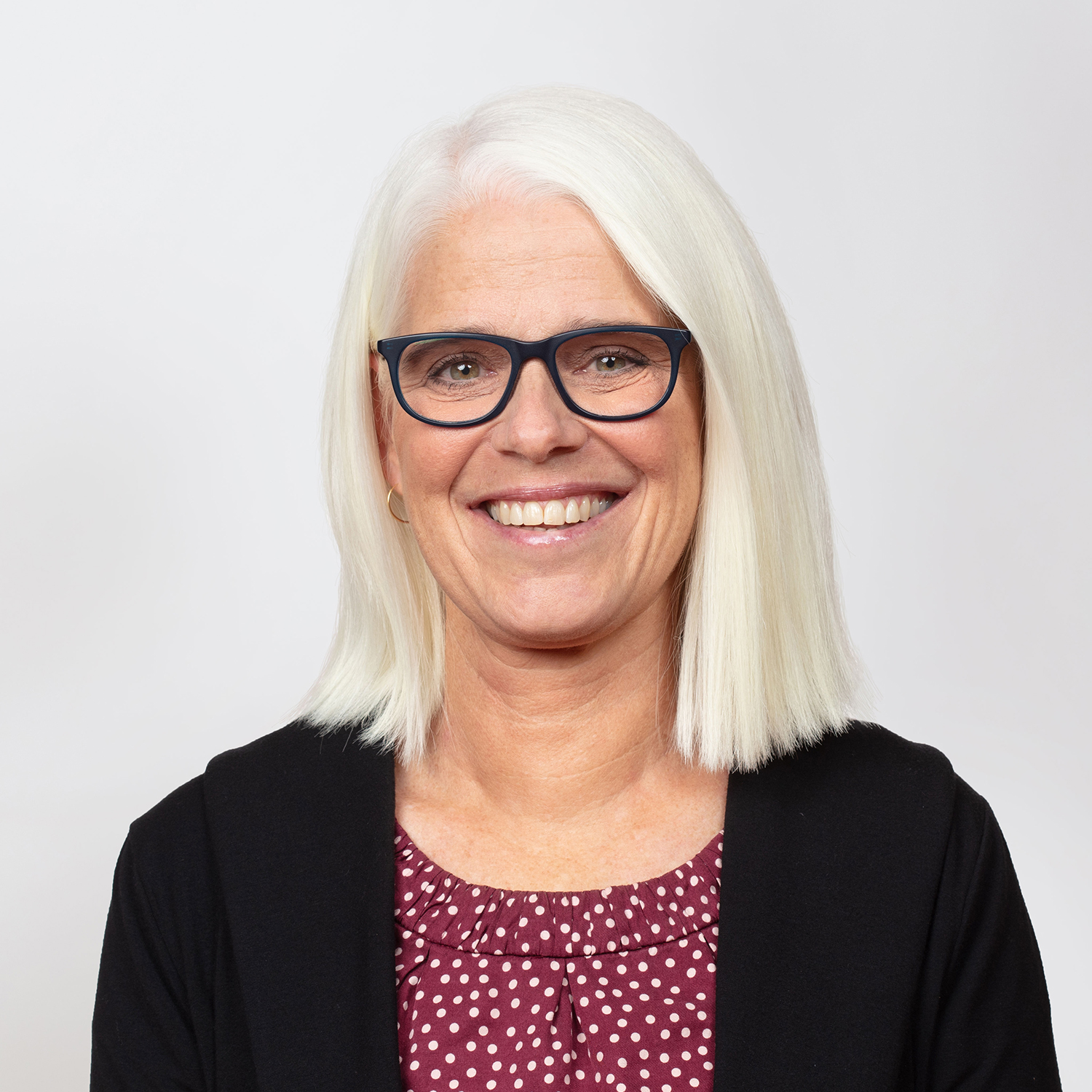Blue Cross Foundation hosts second annual forum on building healthy generations, focusing on Indigenous health
October 15, 2024"You are in a position to plant the seeds. To show people what healing looks like – the many faces of healing. Healing from the inside out with a more holistic approach. And it can change everything."
This was the empowering challenge shared by Dr. Anton Treuer at the Blue Cross and Blue Shield of Minnesota Foundation’s recent Building Healthy Generations event. The event convened more than 120 community and Blue Cross leaders to reflect on Indigenous health, the interconnected roles of language, culture and community, and pathways to lifelong health across generations. Event speakers included:
-
-
- Lieutenant Governor Peggy Flanagan
- Dr. Anton Treuer, author and professor of Ojibwe at Bemidji State University
- Kris Rhodes, Foundation board member and director of the Office of American Indian Health at the Minnesota Department of Health
- Martin Jennings, executive director of the Northwest Indian Community Development Center
- Vanessa Goodthunder, director of C̣aƞṡayapi Waḳaƞyeża Owayawa Oṭi at Lower Sioux Indian Community
- Barb Fabre, CEO of Indigenous Visioning and President of All Nations Rise
- Bukata Hayes, Foundation board chair and chief equity officer and vice president of racial and health equity at Blue Cross
- Carolyn Link, Foundation president
-
Key takeaways from Building Healthy Generations
The event offered opportunities for Indigenous leaders to share their insights and wisdom on advancing racial and health equity.
Partnership over paternalism
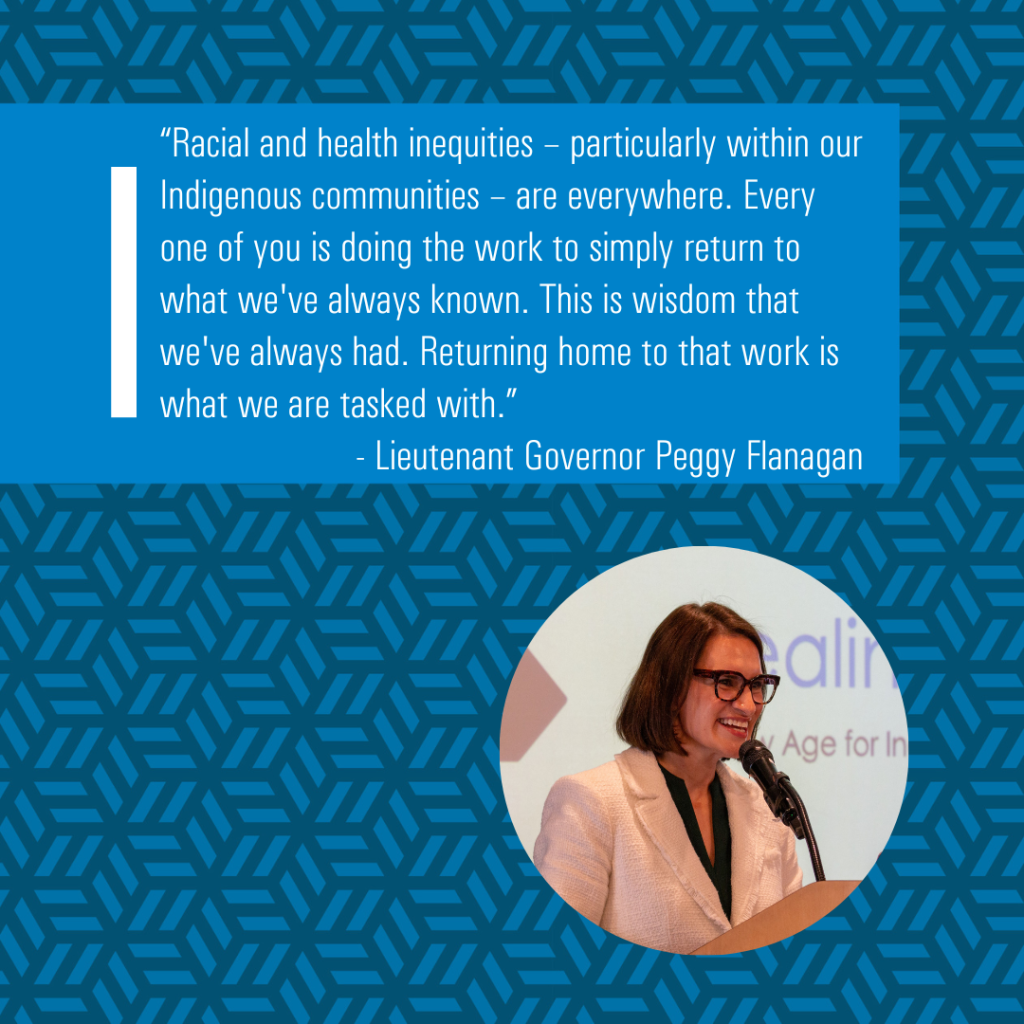 In Lieutenant Governor Flanagan’s opening remarks, she reminded everyone that the work of addressing racial and health inequities means returning to the wisdom that Indigenous communities have always had.
In Lieutenant Governor Flanagan’s opening remarks, she reminded everyone that the work of addressing racial and health inequities means returning to the wisdom that Indigenous communities have always had.
She reflected that the wisdom and insights of Indigenous people is not new, but that reclaiming that wisdom and knowledge from dominant systems and culture is integral to advancing equitable health outcomes.
Dr. Anton Treuer echoed this sentiment in his keynote address, encouraging leaders to seek partnership with the communities they look to serve, instead of having a top-down, paternalistic mindset.
He also encouraged everyone to be open to their own transformation, and not just focus on changing other people.
How language impacts health
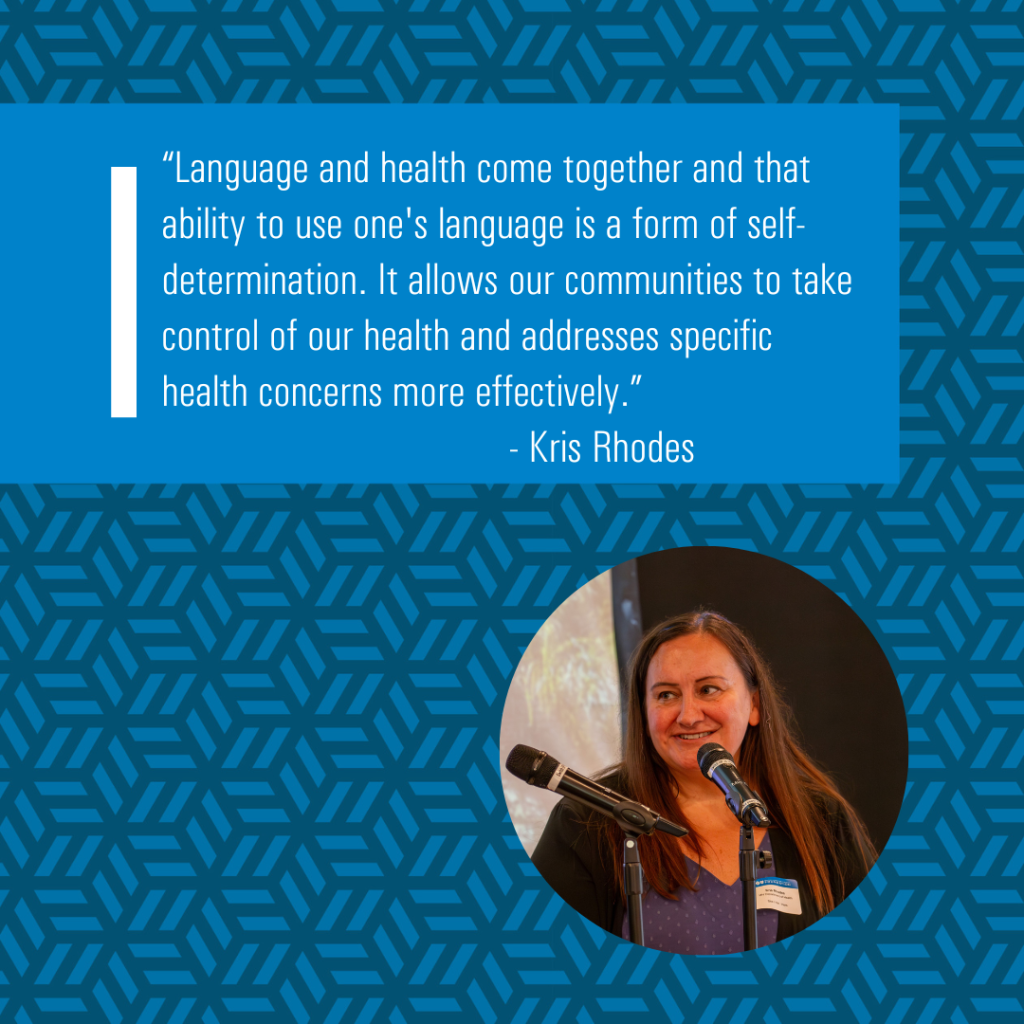 Many of the speakers highlighted the critical relationship between language and health within Indigenous communities. During her conversation with Bukata Hayes, Kris Rhodes shared that culture and language is crucial for community connections and identity, and that community wellbeing is strengthened when a cultural language is spoken.
Many of the speakers highlighted the critical relationship between language and health within Indigenous communities. During her conversation with Bukata Hayes, Kris Rhodes shared that culture and language is crucial for community connections and identity, and that community wellbeing is strengthened when a cultural language is spoken.
She also said that the ability to use and promote one’s language is a form of self-determination and empowerment, that allows communities to take control of their health and address health concerns more effectively.
Vanessa Goodthunder shared her insights on this topic during the panel discussion, sharing that Dakota language learners are able to learn so much about the Dakota people because the language has their worldview inside it.
She encouraged anyone making policy changes to always make sure to involve language, because that is the key to healing historical trauma and remembering, reclaiming and reconnecting to Indigenous identity.
The role of systems change
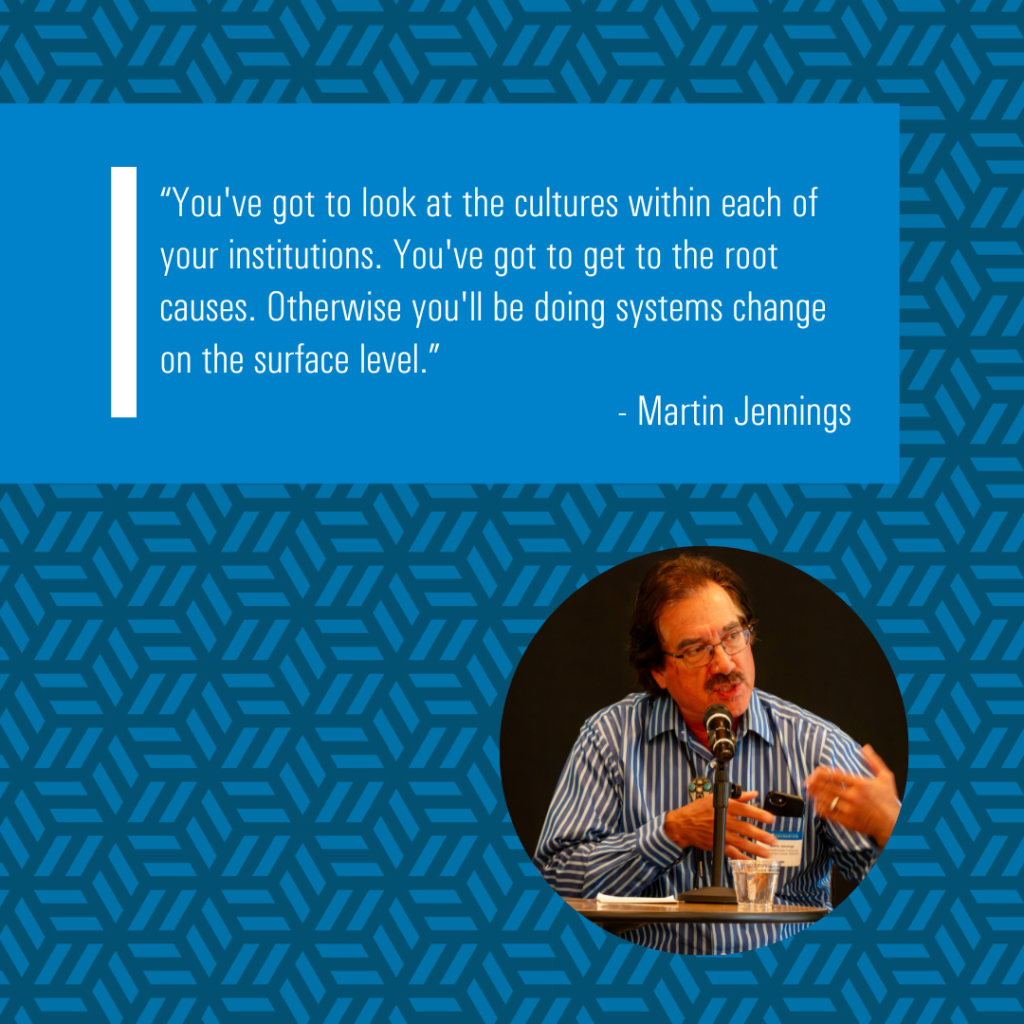
One of the main topics of the panel discussion was changing systems that hold problems in place, and how mainstream organizations can better partner with Tribal Nations and Indigenous-led organizations.
Martin Jennings shared that in order to achieve meaningful change, there has to be fertile ground within the organizations involved. He said that means looking at the cultures within each institution and understanding the value systems and worldviews that exist. Without that internal work, change can only happen at the surface level, when what is needed is deep reflection on whether an organization’s policies, procedures and practices are hindering or contributing to progress.
Barb Fabre agreed, stating that systems have been created by the dominant society, so it’s important for organizations to reflect on how Indigenous communities and communities of color would fit in those existing systems. She recommended looking for opportunities to recreate systems to be more equitable, such as recentering systems around children and families, ensuring that more Black, Indigenous and people of color are in positions of leadership, and empowering parents to be advocates for their children and communities.
Advancing racial and health equity through partnership
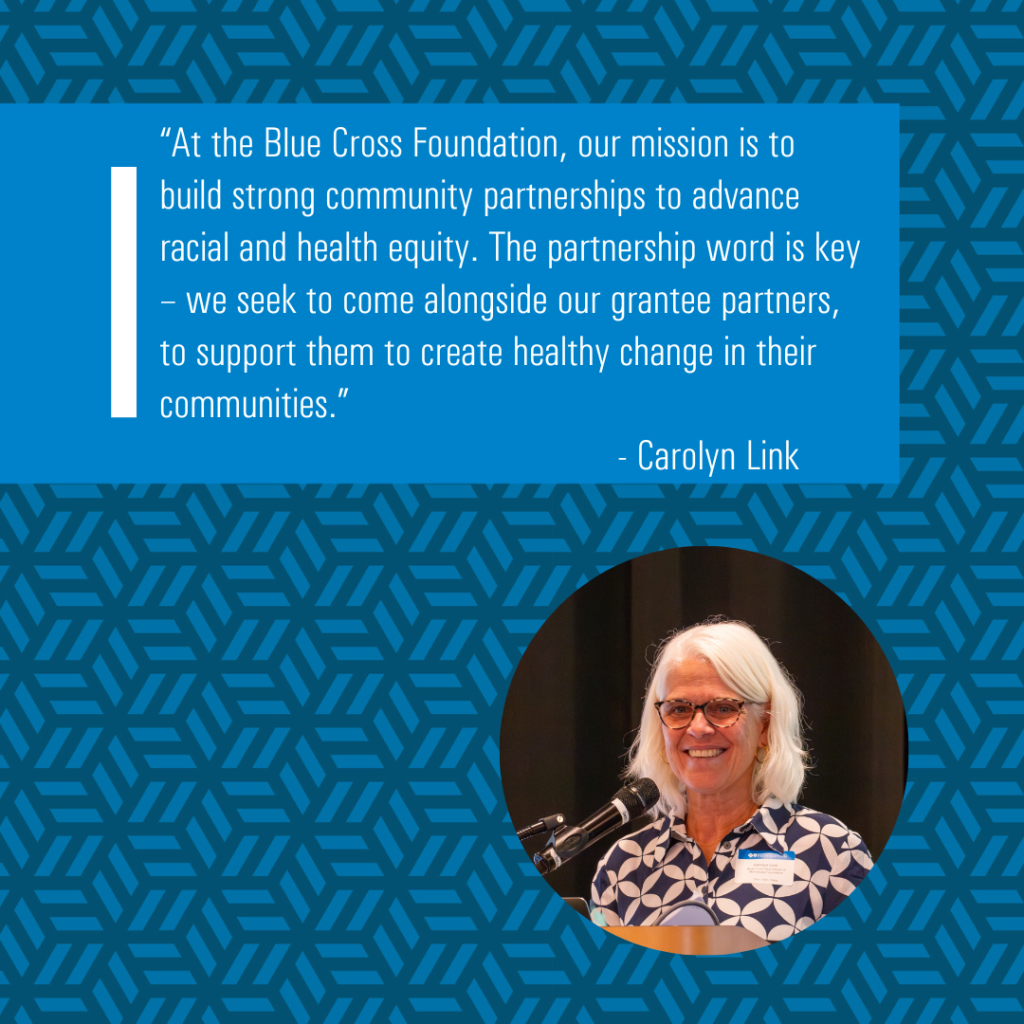 Carolyn Link shared that the mission of the Foundation is to build strong community partnerships to advance racial and health equity.
Carolyn Link shared that the mission of the Foundation is to build strong community partnerships to advance racial and health equity.
She highlighted the word “partnership” – emphasizing that the Foundation seeks to come alongside grantee partners and to support them in creating healthy change in their communities.
As the event concluded, Bukata Hayes reaffirmed the Foundation’s commitment to this important work and asked everyone to reflect on what is holding the reality of racial and health inequities in place.
What are the practices, policies and perspectives that are working against impactful, meaningful change – and what individual and collective power do each of us have to address this reality?
Learn more
Watch the full Building Healthy Generations event here. Learn more about the work of the Blue Cross Foundation.

